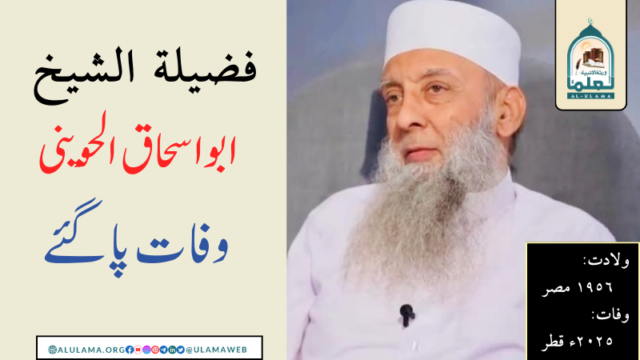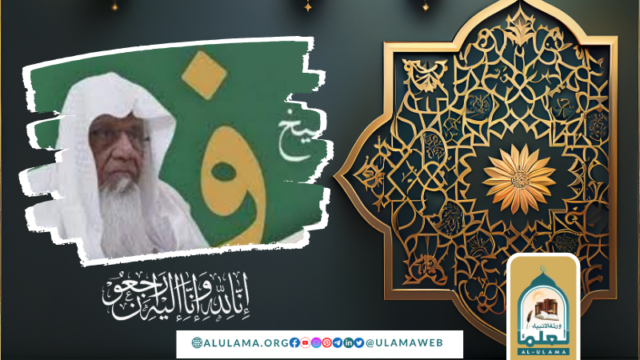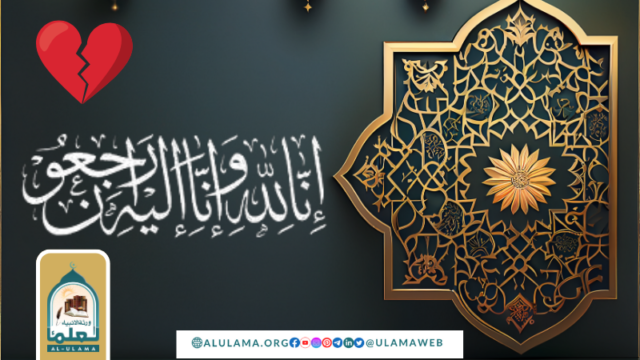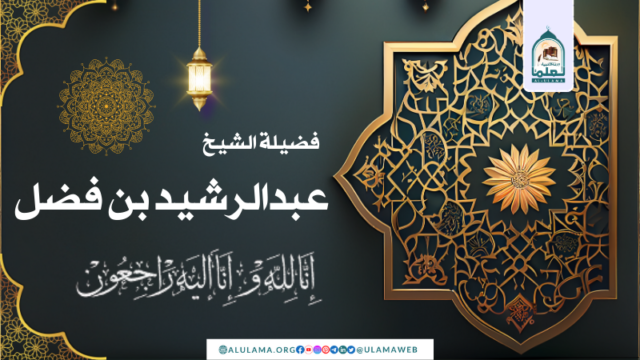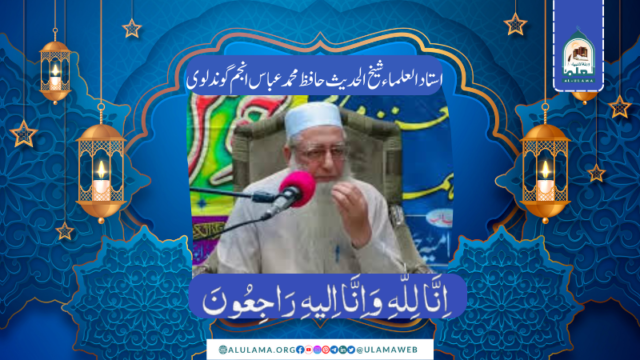The prominet Islamic scholor, the teacher of shariah and mentor of thousands of scholars, the commentator (Mufassir) of Holy Quran and Sheikh of Hadith, Hafiz Abdul Salam bin Muhammad Bhutwi , passed away and leaved us alone and greave afternoon may 29 (To Allah we belong and to Him we shall return).
Students and scholars of Sharia are deeply shocked by his tragic news of death. Pakistan’s great religious scholar, interpreter of the Qur’an and Sheikh Hadith, Hafiz Abdul Salam bin Muhammad Bhutwi, may Allah have mercy upon him, is no longer with us. May Allah SWT accept his services of Deen and grant him highest place in the heaven.
According to the initial reports, Hafiz Abdul Salam felt cardiac pain suddenly, after this he couldn’t survive by this attack and expired away . The organization of “The Scholars” pray that Allah may grant patience to his family members .Aameen. Here is his short bio graph.
Born:
He was born on 29 Ramadan 1365 AH and 27 August 1946 in the village of Bhata Mohabbatein under the province of Okara. He was famous with the nickname “Al-Bhutwi” in reference to this village, which was famous for scholars and preachers, and his father, Hafiz Muhammad Abul Qasim Al-Bhutwi, was also one of the famous scholars. [Some of the people of this village wrote a book in the translations of its scholars, and it was published in Urdu]
Teaching:
He started teaching in the Jamia Muhamdiayah (Muhammadiyah University )of Gujranwala and was associated with it for a period of 26 years from 1966 to 1992. Then he moved to the city of Murideki near the city of Lahore, and founded the Dawa Islamic University .He remained as a “Director of this University” until the end of his life.
Hafiz Abdul Salam bin Muhammad has a passion for teaching, public speaking,( herbal medicine ). He was also great author and was very
eager to writing and research. His publications and books are as follow.
Publications:
1.He wrote translation of Holy Qur’an into Urdu language. He has also written a four-volume Tafsir of the Holy Qur’an called Tafsir al-Qur’an al-Kareem.
2.He was also writing Sharah (description) of Sahih Al-Bukhari the compilations and translations titled
Al-Fath al-Salam, Sharah to Sahih al-Bukhari Imam,
3.Sharh Kitab al-Jami of Balogh al-Maram,
4.Sharh Kitab al-Tahara of Balogh al-Maram,
5.Maqalat e Taiba( articles)
6.Ruls of Zakat and Usher ,
7.Translation of Islamic faith,
8.Translation of Hisn al-Muslim,
9.Why are we doing Jihad?
10.The temptation to declare Muslims as infidels,
11.Hindu customs and practices among Muslims,
12.Halal and Haram Business in the Light of Sharia
13. One Religion and Four Religions.
Expressions and emotions about him:
The entertainment for religious families often includes attending the Friday sermon of renowned religious scholars when visiting a city. It was a cherished childhood tradition for the people of Colony, Gujranwala, to visit Aunt Jan, where they would listen to the inspiring Friday sermon of Sheikh Hadith Maulana Abdul Salam Bhutvi in the beautiful and spacious Masjid al-Fatah. With great enthusiasm, all the cousins would accompany and gain valuable knowledge from his teachings.
Although there was no personal relationship with Maulana Bhutvi, one particular aspect deeply resonated with everyone, as if it struck a chord in their hearts. It was a piece of advice that someone shared, which left a lasting impact. This advice aimed at school children and their connection with technology.
This incident occurred years ago when the use of technology, such as laptops and mobile phones, was not as prevalent. At that time, a friend mentioned that students were strictly prohibited from having mobile phones and laptops at the madrassa in Muridke. However, one brave student sought permission from the respected teacher and convinced him to spare some time. The student wanted to demonstrate software on his laptop, specifically showcasing Maktaba Shamila and its extensive collection of Hadiths. The teacher was greatly intrigued, and they delved deeper into its functionalities. Afterward, the student shared his newfound knowledge with his classmates, saying:
“Even if you have to sell an animal from your home, you must buy a laptop.”
This statement, coming from a revered Sheikh of Hadith, had a profound impact. It created a strong connection, and it became a recurring theme in every gathering, inspiring and motivating the students.
May Allah grant Maulana Abdul Salam Bhutvi a place among the righteous and shower His mercy upon him. With the closing of this chapter, the amalgamation of knowledge and action continues, leaving a legacy of empowerment and inspiration for generations to come.
As Hafiz Abdul Salam bin Muhammad departs from this world, who else possesses such qualities? In an era where materialism has consumed the aspirations of many, is it easy to attain the esteemed status of the Muhadditheen (scholars of Hadith)? However, there are individuals who are not molded by the era; they shape the era, rather than being shaped by it. Some rise to prominence through positions of power, while others through wealth. But how many are recognized and distinguished by their knowledge and morals? Bhatvi Sahib established his identity through knowledge and morals, garnering scholarly fame among the masses. Knowledge is one aspect of a person’s character, while morals are another. Morals provide the means to utilize knowledge effectively, which others may lack. Bhutvi Sahib excelled in both aspects. He dedicated his entire life to the pursuit of Islamic knowledge, sitting as a student and enriching the era with prophetic teachings.
His command over Urdu was so fluent and eloquent that it stirred envy in others. One day, he humbly mentioned that during his time, he would search libraries to find Urdu literature books for a nominal fee. He confessed that he read quickly to save money, and that is why his speech and writing were impeccable. He was cautious and responsible in his words and writings, making them most suitable and appropriate.
I recall a time when his books arrived at the institution where I was in charge of editing. One of our friends, Maulana Ishtiaq Asghar, took up the task of editing his book. When Bhutvi Sahib learned about it, he remarked, “Maulvi sir! This is my book, let it be. If you have something to say, write your own book.” Maulana Ishtiaq Asghar worked extensively on Sheikh’s books and earned the gratitude of the Sheikh. Bhutvi Sahib possessed language fluency, brevity, and conciseness. He had a remarkable clarity and perfection in simplicity. His masterpiece, Minxarul Mzaji, showcased his profound knowledge and scholarship. He never wasted time. Despite facing severe illnesses at times, almost to the point of risking his life, Allah blessed him, and he would bounce back, unraveling the intricacies of translation, interpretation, and Hadith of the Prophet. His true excellence lies in his scholarly contributions. Just as he was a teacher to his disciples, they themselves became the works in progress of future scholars. He embodied a scholarly life in action.
When he embarked on the translation of the Holy Quran, he pursued an extraordinary endeavor. He firmly believed that no word in the Quran is redundant, contrary to what other translators may have understood. He set out to prove it by ensuring that every word and letter in his translation held the exact meaning according to Arabic grammar. Remarkably, his translation flowed smoothly and beautifully in Urdu. While his life was dedicated to an organization, his focus remained steadfast on academic and research matters. He authored a translation of the Holy Quran, a four-volume commentary, and an incomplete work on Sharh al-Bukhari, among other works. He held firm positions and lived by them, not being a proponent of democracy, although he later had to reconcile with his party’s stance. He possessed easy accessibility, acquiring wisdom and herbal medical knowledge. He would effortlessly interpret Persian, Arabic, and Urdu poetry in his teachings,preaching and conversations.
In the final phase of his life, he lived in relative islolation due to his organizational affiliations. Although his life was limited, Allah granted him occasional comforts. He attended a meeting just yesterday, seemingly in good health. According to the audio recording of a disciple present,
he offered prayers and perhaps shared some advice. This turned out to be his last engagement. And now, he has departed, leaving behind a legacy that moves students and scholars alike. A Muhaddith of the previous era bids farewell in this era. May Allah shower His mercy upon him and us, grant him Jannah (paradise), and reward the scholars and people for his contributions. O Allah, Amen.


